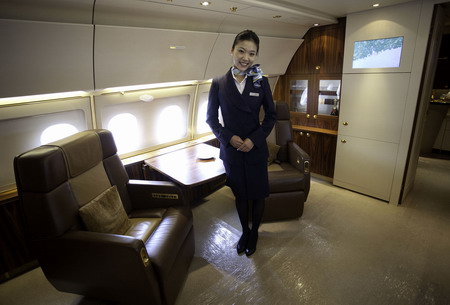BizChina
- Details
- By David Cao
- Hits: 1276
China's power consumption rose 13.41 percent year on year in March to 388.8 billion kilowatt hours (kwh), the National Energy Administration (NEA) said Thursday.
Combined electricity use in the first quarter totalled 1.09 trillion kwh, up 12.72 percent from a year earlier, the administration said.
In the first quarter, power use by the primary, or agricultural, industry rose 3.16 percent to 19.5 billion kwh year on year. The use of power by the secondary, or industrial, industry rose 12.31 percent to 802.5 billion kwh. The tertiary, or service, sector consumed 123.6 billion kwh of electricity, up 15.51 percent.
China's power demand could increase by 12 percent to 4.7 trillion kwh this year, said the research institute of the State Grid Corp. of China on Wednesday. The forecast is higher than the NEA's January estimate which said demand could rise 9 percent to 4.5 trillion kwh this year.
- Details
- By David Cao
- Hits: 1228
Xinjiang's capital of Urumqi will be built into a "core city" in west China and an "international trade center" of central and west Asia by 2020, local authorities have announced.
The goal was set in an urban development blueprint for Urumqi during the 2011-2020 period, unveiled Tuesday after three years of study.
To achieve this goal, local authorities will build faster and more convenient transportation networks to strengthen links between Urumqi and inland Chinese regions as well as areas in central and west Asia, according to the blueprint.
Local authorities will build a new railway line linking Urumqi with Lanzhou, enlarge the current Urumqi railway station, and build a new airport terminal during the next 10 years, the blueprint said.
Read more: China aims to build Xinjiang's capital into int'l trade center
- Details
- By David Cao
- Hits: 1285
Chinese search giant Baidu said it has successfully removed 2.8 million files from its document-sharing website, Baidu Wenku, after getting slammed by Chinese authors who accused the company of encouraging copyright infringement and demanded compensation.
The controversy prompted at least dozens of writers to publish criticisms of Baidu CEO Robin Li, a billionaire and one of China’s most prominent entrepreneurs, over the past week. The criticisms included a satirical mock-interview titled “F— You Too, Robin Li” (in Chinese, English translation from ESWN here) that portrays Mr. Li as a corrupt executive who describes rights as “something to be violated,” and a blog post by famous Chinese novelist and blogger Han Han (in Chinese, English translation from Han Han Digest here) suggesting Mr. Li had built his considerable wealth on the back of others’ work.
The company responded by apologizing to writers and promising to remove infringing content by Tuesday, and saying it would shut down Wenku, known as Baidu Libary in English, if problems persisted.
Company spokesman Kaiser Kuo said that Baidu removed most of the files suspected of being unlicensed — largely found in its “literary works” category — as of 3 p.m. Tuesday, and is in the process of arranging a new discussion with representatives from the publishing industry. He said he couldn’t guarantee that 100% of the pirated content on Baidu Library is gone, but “I very much hope that they [the authors] see this was a good faith effort on our part and that it will form the foundation for future talks.”
Read more: In Bow to Authors, Baidu Scrubs Document Sharing Site
- Details
- By David Cao
- Hits: 1467
The Chinese computer maker Lenovo Group said on Monday that it plans to launch two or three new tablet computers later this year, accelerating its pace to catch up with Apple Inc's latest iPad 2.
Chen Xudong, vice-president of the world's fourth-largest PC vendor by market share, told China Daily that Lenovo plans to launch a new tablet computer for corporate users over the next two quarters. It will also launch the second version of its tablet computer, LePad, in the fourth quarter of this year.
"Like personal computers, different users will have different demands for tablet computers," said Chen Xudong, who is also the general manager of Lenovo's China business.
He said the country's biggest computer maker will adopt a "multi-model" strategy in its battle with Apple in the tablet computer market.
Lenovo on Monday launched its first tablet computer LePad, which is based on the Android 2.2 operating system. The product, starting at 3,499 yuan ($533), comes in two versions that support Wifi and 3G services.
- Details
- By David Cao
- Hits: 1712
With its steaming economy and surging ranks of billionaires, China has become the fastest-growing market for Airbus' private jet business, with at least 25 corporate jets to be sold in the next five years.
"The demand for corporate jets is already very high, and the government is more supportive of corporate aviation," Francois Chazelle, vice-president of worldwide sales at Europe's Airbus Corporate Jets, said at a news conference on Monday.

A flight attendant in an Airbus A318 Elite business jet on display at the Business Aviation Center during the Asian Aerospace International Expo and Congress in Hong Kong on March 9.
Eric Chen, senior vice-president of Airbus China, added: "Five aircraft a year is a conservative figure. We have already sold two in the first quarter of this year in China."
More Articles …
Page 35 of 120